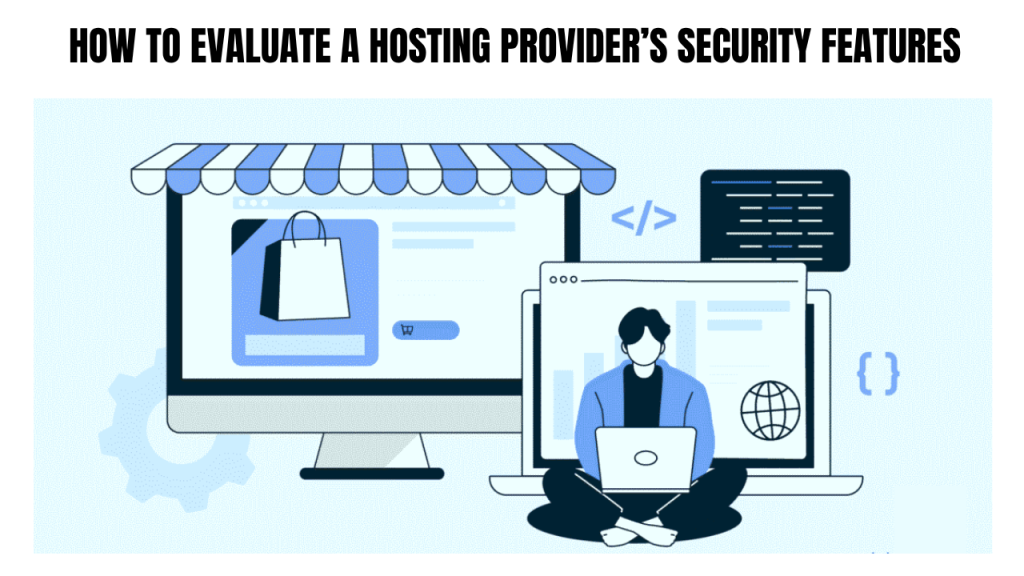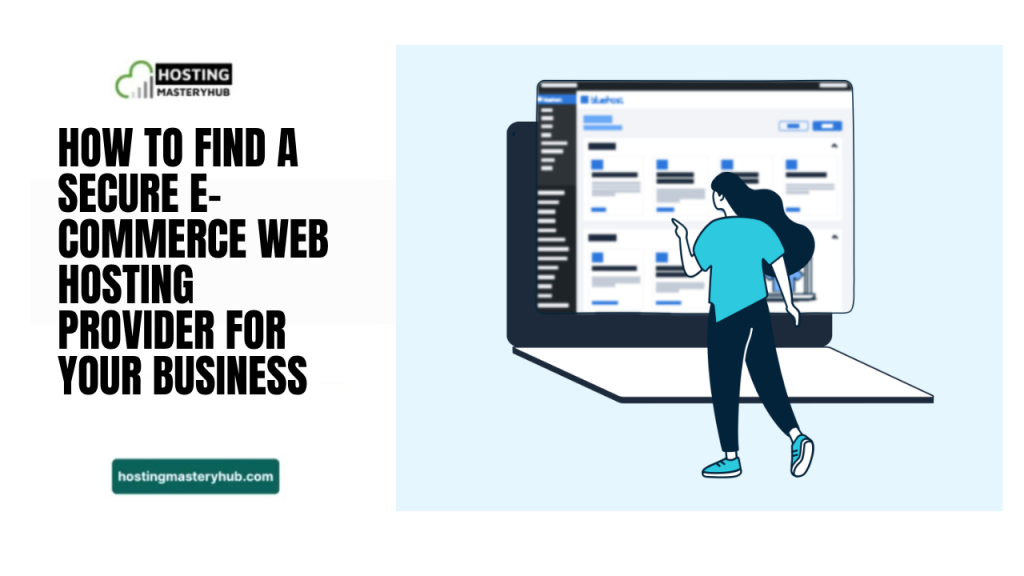Introduction
Running an online store is exciting, but it also comes with significant responsibilities. One of the most essential choices you’ll make is to find a Secure E-commerce Hosting Provider. Think of it like choosing the perfect home for your business.
With the right ecommerce website hosting, your store loads faster, looks professional, and earns trust.
What Is Secure E-commerce Hosting and Why Does Your Business Need It?
When you run an online store, your hosting isn’t just storage space; it’s the foundation of your business. Secure e-commerce website hosting mastery hub protects customer data, keeps hackers at bay, and ensures a smooth shopping experience.
Without it, your store risks downtime, slow pages, or worse, stolen information.
Key Features of Secure Hosting
Not all hosting is created equal. The best hosting for ecommerce comes with SSL certificates, firewalls, backups, and regular updates. These tools guard your site and make sure customer details stay private.
A good provider will also offer malware scanning, DDoS protection, and two-factor authentication.
How Hosting Affects Customer Trust and Sales
Your hosting choice is a silent salesperson. When your website loads fast and payments feel safe, shoppers are more likely to click “buy.” On the other hand, slow pages or broken checkouts chase people away. Reliable ecommerce website hosting makes customers comfortable sharing their details.
Essential Factors to Consider When Choosing a Secure Hosting Provider
Selecting the right hosting company is akin to choosing a business partner. Look for one that blends speed, safety, and support. The best ecommerce hosting doesn’t just keep your store live; it makes it shine.
From uptime guarantees to backup plans, every detail matters. Think about the long run, because the right provider grows with you as your store gets bigger and busier.
SSL Certificates and Data Encryption
An SSL certificate is like a lock on your shop’s front door. It encrypts customer details, keeping them safe from cyber thieves. Without SSL browsers even flag your site as “not secure.
Data encryption works behind the scenes making private info unreadable to outsiders. Both are non-negotiable if you want your store to feel professional and trustworthy.
PCI Compliance for Secure Payments
If you accept cards online, PCI compliance is a must. It’s a security standard that ensures payments are handled safely. Shoppers want assurance that their money is safe from fraud. The best hosting for ecommerce providers builds PCI compliance into their services.
This saves you stress and keeps your store on the right side of industry rules.
Uptime Guarantees and Reliability
Imagine your store going down during a big sale that’s lost money and trust. Uptime guarantees protect you from that nightmare by keeping your store live almost 24/7. A reliable host backs up its promise with strong infrastructure and quick recovery plans. It means customers can shop at any time without frustration.
Server Speed and Performance
- Online shoppers don’t like waiting for slow sites; they push them away.
- Fast servers keep pages smooth and checkout easy.
- High-performance hosting improves speed and reliability.
- Quick-loading sites also get better SEO rankings.
Types of Hosting Options for E-commerce Stores
Choosing the right hosting is like picking the right outfit; it must fit your style, needs, and budget. For e-commerce, this decision is even more critical, as it directly affects how customers shop. The best ecommerce hosting will give your store speed, safety, and room to grow.
- Shared Hosting: Cheapest and easiest to start with. But you’re sharing space with other sites, so if one has issues, yours could too. Best for small stores testing the waters.
- VPS Hosting: Middle ground. You still share a server, but with fewer sites, so you get more control and stability. A great choice when your traffic starts growing.
- Dedicated Hosting: All yours! You don’t share resources, so your store runs super smoothly. It’s pricey but worth it for large businesses that need speed and total control.
Cloud Hosting for Scalability and Security
Cloud hosting is like having a flexible closet that expands when you buy new clothes. It automatically adjusts as your store grows or gets sudden traffic spikes. You’ll never worry about crashing during a big sale.
Many owners consider it the best hosting for e-commerce because it combines speed, reliability, and security all in one.
Managed Hosting for Hassle-Free Security
Don’t want to deal with tech stuff? Managed hosting has your back. The provider handles updates, patches, backups, and even monitoring. All you have to do is focus on your business. It’s a stress-free option, especially if you don’t have an IT team.

How to Evaluate a Hosting Provider’s Security Features
Not every hosting company takes security seriously, and that’s where research comes in. The best ecommerce hosting providers are upfront about their safety tools, while shady ones stay vague. Before signing up, check their list of protections.
Look for firewalls, scanning tools, DDoS defense, backups, and regular patching.
Firewalls, Malware Scanning, and DDoS Protection
Think of these as bodyguards for your online shop. Firewalls keep bad traffic out, malware scanning spots harmful files, and DDoS protection prevents your site from crashing under fake traffic floods.
Together, they build a security wall around your business.
Regular Security Patches and Software Updates
Hackers love exploiting old, unpatched systems. That’s why updates matter. A good provider releases fixes fast and keeps your environment clean and secure. This doesn’t just protect your shop, it also shows customers that you take their safety seriously.
Shoppers notice when a site feels safe and smooth.
Two-Factor Authentication and Access Controls
Two-factor authentication is like adding a second lock to your door. Even if someone guesses your password, they can’t get in without a second code. Access controls are another plus.
You can limit permissions so that only the right people have access to the sensitive parts of your store.
Cost vs. Security: Finding the Right Balance for Your Business
Every store owner has a budget, but going for the cheapest option can backfire. Weak hosting leaves you open to hacks, downtime, and lost sales. Saving money up front might cost you much more later.
Instead, aim for balance. Choose a plan that fits your budget but still offers essentials like SSL, backups, and security monitoring.
Budget-Friendly Hosting vs. Premium Secure Hosting
- Budget Hosting: Affordable and straightforward for beginners, but usually misses key protections. Great for testing but not for long-term growth.
- Premium Hosting: Comes packed with extras like faster speeds, backups, PCI compliance, and top-tier support. It’s more expensive but offers peace of mind.
For serious e-commerce owners, premium hosting is usually worth the investment. It keeps customers safe and your store strong.
Hidden Costs to Watch Out For
Hosting plans sometimes look cheap until you notice the fine print. SSL certificates, backups, or even proper support may incur additional costs. Suddenly, the “deal” isn’t so good. Always compare what’s included in the price.
The best e-commerce hosting is transparent, with no hidden fees lurking in the background.
Best Practices to Maintain Security After Choosing a Secure E-commerce Hosting
Finding the best ecommerce hosting is a big win, but your job doesn’t end there. Security is something that needs ongoing attention. Think of it like keeping your shop clean and organized. It’s a daily effort that pays off in happy customers and safe transactions.
Regular Website Monitoring
Imagine locking your shop at night but never checking if the door is still closed. That’s what skipping monitoring feels like. Regular checks help you spot problems early before they scare off shoppers.
From performance issues to suspicious login attempts, monitoring acts like your store’s security camera.
Updating Plugins, Themes, and Platforms
Outdated software is one of the easiest ways hackers sneak in. Plugins, themes, and your platform release updates are not just for new features but also for essential security fixes. Keeping everything up to date keeps your store fast, safe and stable.
Plus, updated software usually means better compatibility, so your site runs smoother on all devices and browsers, something every shopper loves.
Employee Training on Cybersecurity
Even the strongest hosting can’t protect you if someone on your team makes a simple mistake. That’s why training is key. Teach employees how to spot phishing scams, set strong passwords, and avoid unsafe downloads.
When everyone knows how to stay safe, your store becomes much harder to target.
Conclusion
At the end of the day, your online store’s security is about more than just tech; it’s about trust. Shoppers want to feel confident when they share their details and click that “buy now” button. A safe site shows them you care about their privacy which makes them more likely to come back.
With reliable ecommerce website hosting and innovative practices, you’re not just protecting your business, you’re creating a brand people love and recommend.
FAQs
How do I know if my e-commerce hosting provider is secure?
A secure host will be open about its protections. Look for SSL certificates, PCI compliance, malware scanning backups and clear customer support. If these aren’t offered it’s a sign to look elsewhere.
What is the difference between regular web hosting and e-commerce hosting?
Regular hosting works fine for blogs or small websites. Ecommerce website hosting, on the other hand, is built for online shops. It comes with additional safety features, payment security, and performance enhancements that support a seamless shopping experience.
Do I need a dedicated server for my online store?
Not always. Small or medium shops often do well with VPS or cloud hosting. Dedicated servers are ideal for large brands with high traffic and numerous sales. It depends on your growth and budget.
How does SSL impact SEO and customer trust?
SSL keeps data private and shows the little padlock icon in browsers. Customers feel safe entering details, and search engines reward secure sites with better rankings. It’s a win-win for trust and visibility.
What should I check in a hosting provider’s uptime guarantee?
Aim for at least 99.9% uptime. Anything lower means too much downtime, which could cost you both sales and reputation. A strong uptime guarantee demonstrates that your provider is a reliable one.
Can I switch hosting providers without losing data or SEO rankings?
Yes! With careful planning, backups, and proper migration steps, you can move smoothly. Many of the best ecommerce hosting companies even offer free migration support, so you don’t have to stress about data loss or SEO drops.
Latest post:
- How to Find a Secure E-commerce Hosting Provider for Your Business
- Best Online Shop Hosting Options for Startups and Growing Stores
- Top E-commerce Web Hosting Companies to Watch in 2025
- Best Hosting Plans for E-commerce Websites: How to Choose the Perfect Fit
- Comparing Black Friday Hosting Deals 2018 to 2025: Pricing Trends & Features
